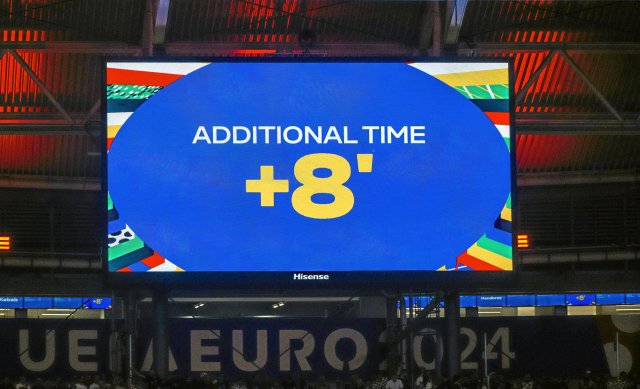Previously the absolute exception, today it’s more the rule: long stoppage times in football.
Photo: imago/Matthias Koch
Without added time, the “mother of all defeats” would have become little more than a small entry in the archive of football history. On May 26, 1999, FC Bayern looked like the sure winner for 90 minutes in the Champions League final in Barcelona. A direct free kick from Mario Basler in the 6th minute gave Munich an early lead in the duel with Manchester United. In front of 90,000 spectators at Camp Nou, Bayern then dominated the action, hitting the post and crossbar. But in the 91st minute the Red Devils were awarded another corner by referee Pierluigi Collina. David Beckham picked up the ball and United goalkeeper Peter Schmeichel rushed into the opponent’s penalty area. What happened nextsends shivers down the spines of all Bayern fans over 30 to this day.
First, Teddy Sheringham was in the right place to equalize the score at 1-1 after a short clearance and a failed shot from the edge of the penalty area. Only for Ole Gunnar Solskjær, who had recently been substituted, to turn the game completely inside out in the 93rd minute after another Beckham corner. Within three minutes, United had stolen the pot they thought was safe from Munich. After the final whistle, 38-year-old Lothar Matthäus cried on the Bayern bench, Peter Schmeichel shot flick-flacks through his penalty area for joy and United coach Alex Ferguson was knighted by the Queen – still on the pitch of the Camp Nou.
nd.DieWoche – our weekly newsletter

With our weekly newsletter nd.DailyWords look at the most important topics of the week and read them Highlights our Saturday edition on Friday. Get your free subscription here.
The magnificent chaos of the last few minutes
The best and worst things in football happen in injury time. When the fourth official on the sideline flashes the scoreboard with the additional minutes to play, suddenly anything is possible. Sure victories turn into heartbreaking defeats – and vice versa. Match plans that had been worked out for days are thrown out the window. Defensive chickens are allowed to play centre-forward, goalkeepers visit each other in the penalty area and even the biggest Tiki-Taka fans demand to hit the ball as high and as far forward as possible. As soon as the stadium clock jumps to 90:00, football descends into magnificent chaos.
Schalke manager Rudi Assauer lost the game in stoppage time Believe in the football godwhen his Gelsenkirchen kickers were “masters of hearts” from the 90th to the 94th minute on the last matchday of the 2000/2001 season, before an indirect free kick in Hamburg ruined everything. In March 2017, FC Barcelona needed two goals after the end of regular play to achieve the “Remontada” that was not thought possible and despite a 4-0 first leg defeat against Paris Saint-Germain, they scored one 6:1 in the second leg to still make it to the quarter-finals of the Champions League. And Ann-Katrin Berger proved this summer that it’s not just late goals that create the stuff of legends: the national goalkeeper made a save in the ninth extra minute a penalty against Spain and secured the women of the German Football Association (DFB) a 1-0 victory and the bronze medal at the Olympics in Paris.
A clear trend is already apparent from these four glorious stoppage times: the craziest time in football lasts longer and longer. In 1999, the three extra minutes in the Champions League final felt like an eternity for Bayern. In 2001, four minutes were enough to send Gelsenkirchen through the entire emotional rollercoaster of football. Barça already had five minutes for the “Remontada”. And the German national team had to worry about the bronze medal for a full nine minutes in Paris.
The birth of injury time
The fact that football games today last more than 100 minutes rather than 90 minutes (sorry Sepp Herberger, at least the ball is still round!) is due to a rule that is intended to free the sport from one of its worst aspects: the intentional delay of the game. When adult professionals roll around on the floor for no reason, shoot balls in completely the wrong direction, or suddenly forget how to run at the moment they are substituted, this is not only considered unfair, but also unsightly. Because the playing time in football – unlike in basketball, ice hockey or handball – never stands still, no matter how absurd an interruption may be, added time was introduced – back in 1891.
Back then, in the fourth season of the newly launched English Football League, football games actually lasted exactly 90 minutes. The Aston Villa goalkeeper took advantage of this fact in the game against Stoke City when he knocked the ball off the field shortly before the end of the game when the score was 1-0 for Villa. Stoke had just been awarded a penalty, but when the players finally recovered the ball, the 90 minutes were over and the game was whistled. Afterwards, the English association decided that delays in play would be replayed and a game could not end without a previously awarded penalty being taken.
A new era for the World Cup in Qatar
A lot has changed in football since then and a lot has stayed the same. More than 130 years after the introduction of stoppage time, time play continues to be a problem. For the 2022 World Cup, the world football association Fifa decided to radically reinterpret the rule: every delay should be consistently added to the game duration. There should be extra minutes not only for injuries, substitutions and time wasted, but also for celebrating goals, showing yellow and red cards, penalty kicks and of course for the use of the video referee (VAR). “We will calculate injury time very precisely and try to make up for the time that is lost,” explained referee boss Pierluigi Collina, who once ordered Barcelona’s fateful three minutes, before the tournament in Qatar.
What followed was the longest World Cup of all time – in terms of the length of the individual games. The referees allowed an average of ten minutes for the game to be replayed. This led to a whole series of records on the second day of the World Championships. In the group game between England and Iran, there were 14 additional minutes in the first half due to an injury to the Iranian keeper and a VAR decision – there was never a longer stoppage time at the World Cup. Another 13 minutes were added in the second half. With a total playing time of 117 minutes, it was the longest World Cup game that did not go into extra time. In addition, Iranian striker Mehdi Taremi scored the latest World Cup goal in a game without extra time with his goal to make it 2:6 in the 103rd minute. And in the very next game, Dutchman Davy Klassen secured second place in the ranking of the latest World Cup goals with his goal in the 99th minute against Senegal.
But not everyone liked the idea that football games should always last over 100 minutes in the future. Since the World Cup two years ago, a dispute has broken out over how long replays can actually take place. On the one hand, there is FIFA, which, after the tournament in Qatar, recommended that all football competitions worldwide significantly increase injury time. FIFA will also enforce the directive at the 2023 Women’s World Cup in Australia and New Zealand. In contrast, Uefa, Europe’s football governing body, and many national associations are much more skeptical about the temporal expansion of football.
Dispute between FIFA and UEFA
After the Women’s World Cup, Roberto Rosetti, UEFA’s head of refereeing, explained that there were more important things than the exact accounting of every single delay in the game: “We are calling on our referees to speed up the resumption of the game instead of concentrating on added time.” Similarly was also the sound of DFB referee instructor Lutz Wagner, who announced in the Sportschau at the start of the 2023/2024 season that in individual cases there could be an extra ten minutes in the Bundesliga in the future, “but It’s not generally the case that we want to extend the games extremely.” Just the threat of replaying every time wasted could have a positive effect, said Wagner: “We’re also relying a little on the learning effect of the players “We don’t want to delay the game so much anymore so that we don’t need the exorbitantly long stoppage times.”
What has happened on the pitch since then, despite Wagner and Rosetti’s statements, feels more like a secret victory for FIFA. In the Bundesliga, as well as in the other top leagues in Europe and also in the European football competitions, the game has been played for significantly longer since the 2022 and 2023 World Cups. Double-digit stoppage times remain the exception, but hardly anyone gets upset about six, seven or eight extra minutes anymore.
»Laterkusen« and a new European Championship record
Instead, some unforgettable moments have been added in the additional minutes. Bayer Leverkusen’s “Invincibles” championship season would also have been impossible without the new era. The Werkself scored decisive goals after the 90th minute six times in the Bundesliga. Especially on the 30th and 31st matchdays, everything looked as if the first unbeaten season in Bundesliga history would remain a Leverkusen dream. Dortmund and Stuttgart had the German champions on the very brink of defeat. But against BVB, Josip Stanišić headed in a corner to make it 1-1 in the 97th minute. And a week later, national player Robert Andrich somehow heaved the ball over the Stuttgart goal line in the 96th minute to make it 2-2.
The men’s European Championships in the summer actually continued exactly where the World Cup in Qatar had left off. With ten goals in stoppage time, a new European Championship record was set after the group stage. These again included extremely late goals such as Hungary’s equalizer against Scotland in the 100th minute or Mattia Zaccagni’s shot that secured Italy’s place in the round of 16 against Croatia in the 98th minute. Jude Bellingham’s iconic overhead kick, with which the Englishman saved his team into extra time in the first knockout round against Slovakia in the 95th minute, came almost a little early.
Since its invention, injury time has reliably delivered legendary sporting moments. For marketing reasons alone, Fifa, Uefa and the DFB probably have little interest in shortening the last minutes of the game again – even if the “mother of all defeats” will eventually have countless daughters as a result. It remains to be seen whether the extra minutes fulfill their actual purpose and help reduce the time game. Positive tendencies can be seen, but the injury time cannot be much longer. Because then the next market logic takes effect: after the final whistle or before the next game there must always be enough time for television advertising, otherwise the football business will lose its money. And as we all know, this is the only moment in this sport when “even more” isn’t better.
